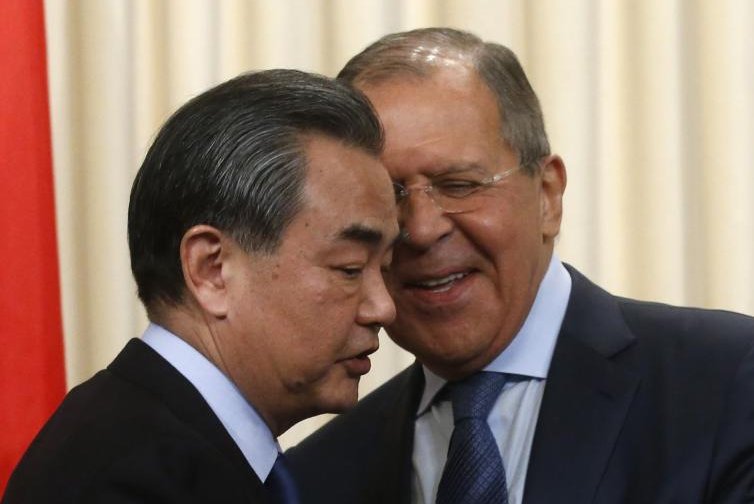Russian Foreign Minister Sergei Lavrov (R) and Chinese Foreign Minister Wang Yi (L) shake hands after their negotiations in the Foreign Ministry guest house in Moscow on Friday. Photo by Sergei Chirikov/EPA
May 26 (UPI) -- Russia and China agreed the deployment of a U.S. missile defense system in South Korea increases tensions on the peninsula, although THAAD may already be operational and tracking North Korean missiles.
During a meeting between Russian Foreign Minister Sergey Lavrov and his Chinese counterpart Wang Yi in Moscow on Friday, the two sides agreed they stand opposed to actions that encourage tensions on the peninsula.
"We insist on ensuring peace and stability on the [Korean] peninsula, [oppose] any negative actions and statements that contribute to tension, oppose the deployment of the THAAD system in [South Korea] under the pretext of the [North Korea] nuclear problem," Wang said.
Wang also expressed faint praise for recently elected South Korean President Moon Jae-in, for his willingness to solve the North Korea nuclear issue through dialogue.
"As for North Korea, our attitude is very clear. We hope and call on North Korea to stop taking actions against [United Nations] resolutions and create necessary conditions for the restart of peace talks," Wang said.
"The origin of the nuclear crisis on the Korean peninsula is a security issue. All sides should focus on the security issue," Wang added, referring to not only North Korea's nuclear threats but also to joint U.S.-South Korea military exercises that Beijing has claimed are raising tensions and making North Korea nervous.
In his statement to reporters in Moscow, Lavrov referred to recent remarks from U.S. Secretary of Defense James Mattis, while agreeing "the use of force to resolve the Korean peninsula program would be fatal and catastrophic."
Lavrov also said, "North Korea's actions must not be used as a reason to engage in excessive military buildup, such as the U.S. deployment of the THAAD system," according to South Korean news agency Yonhap.
"Washington, Seoul and even Pyongyang started speaking about [dialogue], but each of them lays down conditions which presuppose that another one must make the first step." the Russian foreign minister added.
Moon had pledged during his presidential campaign the deployment of THAAD would come under review.
Moon's administration, however, is acting cautiously on any major decision ahead of the first U.S.-South Korea summit in June, Yonhap TV reported.
China and Russia claim THAAD's powerful radar could be used to monitor military movements in the region.















